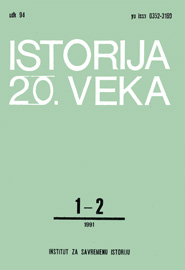DEMOKRATSKA STRANKA О DRŽAVNOM PREUREĐENJU
KRALJEVINE JUGOSLAVIJE (1935 - 1941)
THE DEMOCRATIC PARTY AND THE RESTRUCTURING OF THE STATE IN THE KINGDOM OF YUGOSLAVIA (1935 -1941)
Author(s): Mira RadojevićSubject(s): Political history, Recent History (1900 till today), Interwar Period (1920 - 1939), WW II and following years (1940 - 1949)
Published by: Institut za savremenu istoriju, Beograd
Keywords: Kingdom of Yugoslavia; democratic party; restructuring of the state; 1935-1941;
Summary/Abstract: According to many contemporaries of the Kingdom of Yugoslavia and those who later studied its history, the biggest problem faced by the first state of the Yugoslav peoples was the question of its structure. The fact that this issue pushed into the background the no less serious socio-economic problem, only added to its gravity. The Democratic Party went through a market process of evolution while taking part, at the time, in the laborious debates which revolved around state and legal issues, in search of a solution to the problem of the state’s structure. Following the formation of the Kingdom of Serbs, Croats and Slovenians, this party, together with the Radical Party, was among the most convinced advocates of a unitarianistic-centralistic structure of the state and, as such, was one of the authors of a constitution founded on these notions, the Vidovdanski ustav (1921). Only a year later, influenced by the Croats’ reluctance to accept the Constitution and by the »negative experience« gained from its application in practice, the Democrats began voicing doubts regarding the way in which the question of the state’s structure had been resolved in the Constitution. In early 1933 they suggested that the state should be restructured by dividing the country in four units - the Serbian, Croat, Slovenian and transitional, Bosnian-Hercegovian. True to their conviction that the existence of a state of the Yugoslav peoples is necessary and unwilling to give up the idea of Yugoslavia, they wished to avoid both a trilateral division and the creation of sharp distinctions between the Serbs and Croats. Following the Cvetković-Maček Agreement, they accepted the trilateral division but demanded that all territories outside the Slovenian and Croatian regional units form a part of the Serbian unit. Throughout the evolution of their views regarding state and legal issues, the Democrats preserved certain basic principles - the conviction that the existence of a common state of the Serbs, Croats and Slovenians is historically justified, the assertion that Serbs, Croats and Slovenians are, if not one, then certainly the closest peoples mutually, the belief that a state can continue to exist only if its national and regional parts are united by solidarity and if they are ready to accept, along with partial interests, the interest of the state as a whole . . .
Journal: Istorija 20. veka
- Issue Year: 1991
- Issue No: 1+2
- Page Range: 37-63
- Page Count: 27
- Language: Serbian

